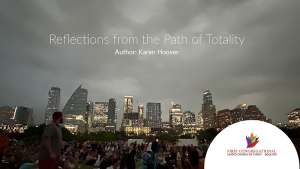“Do Not Be Anxious . . .”
Author: Harriet Simons
Which one of the following phrases “speaks” to you? (1) This is the day which the Lord hath made; we will rejoice and be glad in it. (Psalm 118:24). (2) Sufficient unto the day is the evil thereof. (Mathew 6:45). (3) Live in the moment. (4) It is what it is.
The first two are from the Bible, and I heard them all my life. I was an adult before I considered the third phrase. I associate it more with Buddhist practice or what many refer to as mindfulness. The fourth phrase is one some folks utter in times of stress or frustration.
I always preferred the first verse above. It seemed so positive, and was fairly easy to observe. “Don’t worry, be happy.” OK. Verse number 2 was my Dad’s favorite. He would often say it to me in my younger years when I’d whine about events coming up for which I felt unprepared. I was definitely a worrier. Since we had only the King James Version of the Bible in our house, I didn’t understand exactly what that verse even meant. One day I came upon an English version: “So do not be anxious about tomorrow; tomorrow will look after itself. Each day has troubles enough of its own.” I came to realize that my father, too, was a worrier. His mother must have cautioned her boy with that verse from Matthew when he was young.
The phrases I have numbered 3 and 4 above I hear more often these days. Who can argue that living in the moment is not a good practice? Its message is similar to the verse in number 1. number 4, however, reflects an opinion that there is nothing that can be done about a particular unpleasant situation.
So here we are, trying to find meaning in our enforced isolation during a pandemic that most of us have not previously experienced. How can we rejoice and be glad in each day? Do we just have to accept a trying circumstance somehow? Surely, we have to figure out how to re-create our personal and professional lives going forward. Is this the same thing as fretting about tomorrow’s troubles? How can planning for the future be considered a bad thing?
Whether we have new working or family responsibilities or are retired with too much time on our hands, “living in the moment” may not be such a hard sell and is worth considering as we go about our day. But just giving up and dourly proclaiming “It is what it is” doesn’t sound to me like a good plan.
Still, I believe that there is something in all four of my chosen phrases that we can use to positive effect. The pandemic is here, of course, and cannot be discounted. One need not succumb to despair over what might happen tomorrow. We can, however, discover some uncommitted moments to live in and appreciate the calmness that they may bring.



